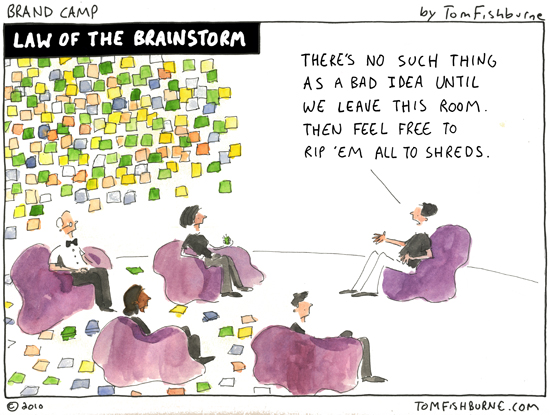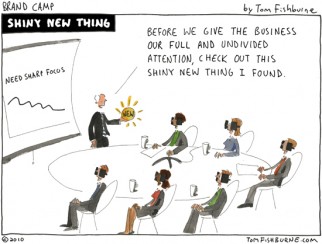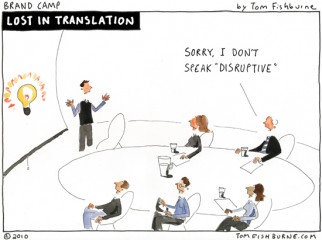We can thank adman Alex Osbourne for the Brainstorm (he’s the O in the agency BBDO). Alex invented the Brainstorm in 1939 as an alternative to the usual meetings of “discouragement and criticism which so often cramp imagination”.
Alex Osbourne realized that an environment is needed where judgement is suspended and ideas have space to grow. As part of the attitude adjustment, Brainstorm facilitators run through the same set of stock Brainstorming rules: there’s no such thing as a bad idea, quantity counts over quality, encourage wild ideas, etc. These rules help attendees shift mental gears from their regular work state of mind.
Tom Kelley, co-founder of IDEO, frames the best rules in this classic 9-year-old Fast Company article, “Seven Secrets to Good Brainstorming“.
Those Brainstorming rules everyone agrees to at the beginning of the Brainstorm evaporate the moment we leave that conference room door at the Hilton. Idea generation is one part of the creative process, not the entire process. Brainstorming a mountain of sticky notes with ideas will not overcome the organizational cuts that occur as the ideas are developed.
I toured an IDEO office recently and it’s clear that they live the spirit of suspended judgement each and every day, not just during a scheduled Brainstorm. It’s in their DNA. Imagination continues as the idea develops all the way to completion, even as options are narrowed and choices are made. This everyday business creativity is inherently more enduring than what most companies accomplish in a one-day offsite.
Instead of focusing on the quantity of ideas developed at the front-end of the process, organizations should apply effort to continued creativity as ideas are developed. We should question why our regular office environment promotes “discouragement and criticism which so often cramp imagination”.
Until we solve that more glaring issue, any Brainstorming rules to suspend judgement are superficial are short-lived. The real goal afterall is not just creative ideas at the end of a Brainstorm, but more imaginative products and services that reach consumers and customers. It’s idea development, not idea generation, that counts.



Michel LECOQ says
Letter to Tom Fishburne
About Osbourne
I noticed that Friedrich Schiller invented in 1788 the rules of Brainstorming. That looks
exactly like the rules (re)discovered by Osbourne.
Here is a small translation exercise
In a letter to his friend Theodor Koerner on December 1788 Schiller wrote: (about a
question from his friend complaining that his creativity was low)
GERMAN ORIGINAL TEXT (language from 1788)
” Der Grund Deiner Klagen liegt, wie mir scheint, in dem Zwang, den Dein
Verstand Deiner Imagination auflegte. Ich muß hier einen Gedanken hinwerfen
und ihn durch ein Gleichniß versinnlichen. Es scheint nicht gut und dem
Schöpfungswerke der Seele nachteilig zu sein, wenn der Verstand die
zuströmenden Ideen, gleichsam an den Thoren schon zu scharf mustert. Eine
Idee kann, isolirt betrachtet, sehr unbeträchtlich und sehr abenteuerlich
sein, aber vielleicht wird sie durch eine, die nach ihr kommt, wichtig;
vielleicht kann sie in einer gewissen Verbindung mit diesen anderen
angeschaut hat. Bei einem schöpferischen Kopfe hingegen, däucht mir, hat der
Verstand seine Wache von den Thoren zurückgezogen, die Ideen stürzen
pêle-mêle herein, und alsdann erst übersieht und mustert er den großen
Haufen.”
FRENCH TRANSLATION
La raison de votre plainte se trouve dans la contrainte que votre
intelligence impose à votre imagination.
() manifestement, il n1est pas bon, car cela gêne le travail créateur de
l1esprit, que l1intelligence examine de trop près les idées qui se
présentent en foule, pour ainsi dire dès leur entrée.
Prise isolément une idée peut être tout à fait insignifiante ou même risquée
à l1extrême; mais elle peut trouver son importance dans une idée qui la
suit.
Il se peut qu1un rapprochement avec d’autres idées qui paraîtraient
également absurdes, soit capable de nous fournir un maillon très utile;
ainsi, notre intelligence n’a pas le pouvoir de juger toutes ces idées avant
qu1elle ait voulu les admettre toutes, et les examiner en corrélation avec
nos autres idées.
Dans le cas de l1esprit créateur, l1intelligence a retiré ses gardiens des
portes où les idées affluent pêle-mêle, pour ne procéder qu1ensuite à leur
examen et à leur contrôle parmi l1ensemble.
ENGLISH TRANSLATION (Tom, please improve this part, English is not my native language)
The reason of your complain is situated in the constrain that your intelligence puts upon
your imagination.
( ) it is not good, because it hinders the creative work of the brain, that intelligence
examines too carefully the ideas that arrive in large quantity, directly from the moment
they appear.
Alone, an idea can be very insignificant, even extremely risky, but it can find its
importance in an idea coming later.
It can happen, that put together with other ideas (seaming also absurd) they could provide
a very useful link; so, our intelligence does not have the power to judge all these ideas
before having them accepted all, and examines them in correlation with our other ideas.
For the creative brain, intelligence has taken its guards from the doors where the ideas
flow pell mell, in order to proceed only later to their examination and their control
amongst the whole.
Here is the site with letters from Schiller
http://www.wissen-im-netz.info/literatur/schiller/briefe/koerner/1788/134.htm
Missy Carvin says
Anyone interested in learning Alex Osbourne’s whole Creative Problem Solving Process should make time to attend the Creative Problem Solving Institute (www.cpsiconference.com). One of the best places to immerse oneself in the *whole* CPS process, not “just brainstorming”.
Su-May Goh says
I often enjoyed the brain storm sessions. I have also seen how great ideas got badly implemented. The idea wasn’t torn to pieces, just the actual leg work.
denise lee yohn says
i started to tweet some of the best bits from this post and then realized that i would be tweeting the whole thing practically — there are so many good points here, particularly the overarching one about judgment vs. imagination — judging is certainly much easier than imagining — perhaps that’s why most companies default to judging?